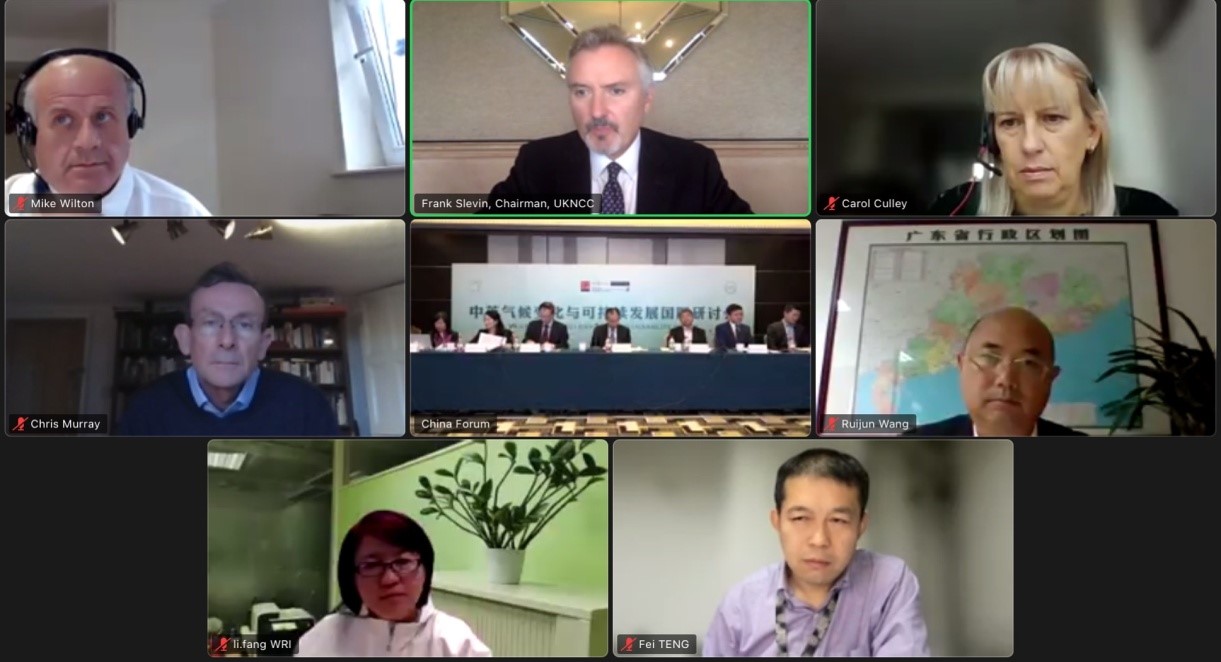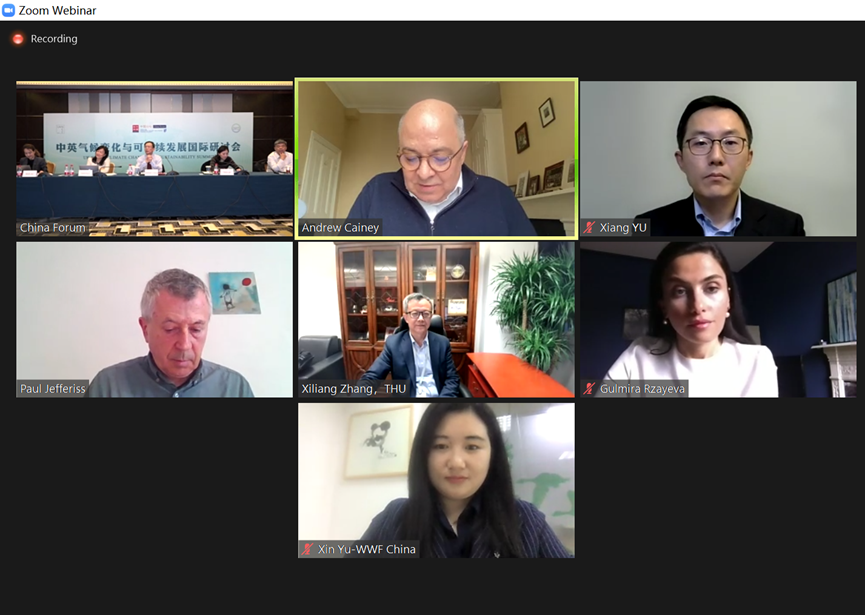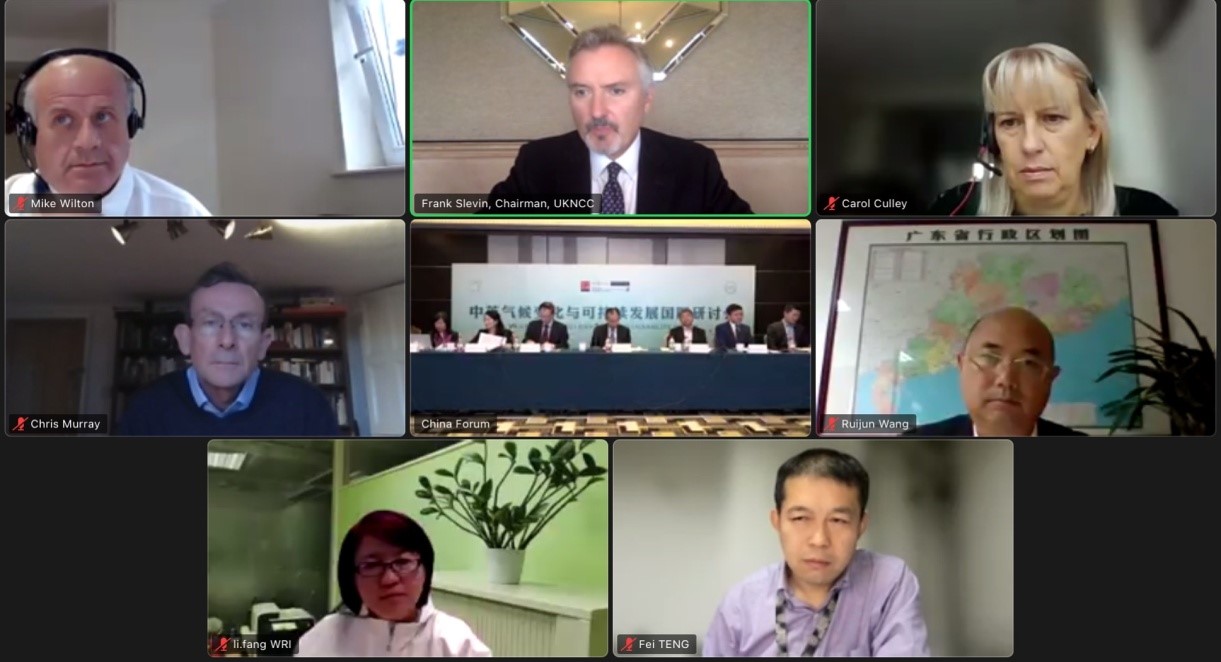The UK-China Climate Change and Sustainability Summit took place on October 27-28, 2021. The event was jointly organized by the China Forum under the Center for International Security and Strategy (CISS) of Tsinghua University, China Public Diplomacy Association (CPDA), and the UK National Committee on China (UKNCC). CPDA President H.E. WU Hailong, Sir Malcolm Rifkind, Chairman of UKNCC Advisory Board, and Sir Tim Smit, co-founder of the Eden Project, delivered welcome remarks.

Chinese panelists (left to right): FANG Li, Country Director, World Resources Institute China; TENG Fei, Deputy Director, Institute of Energy, Environment and Economy, Tsinghua University; WANG Ruijun, Vice Chair, UN Commission on Science and Technology for Development
The summit was structured in four sessions. Session 1 “The race to net zero, and why the world depends on it” was moderated by UKNCC Chairman Frank Slevin. TENG Fei, Deputy Director of the Institute of Energy, Environment and Economy at Tsinghua University, said that COP26 offers an opportunity for the world to reach net zero, but countries should first restore trust and accelerate the Paris Agreement negotiations within a multilateral framework. FANG Li, Country Director of World Resources Institute China, looked into the implicit carbon in world trade today. WANG Ruijun, Vice Chair of the UN Commission on Science and Technology for Development, introduced the city of Shaoguan’s path to net zero.
The UK panel agreed that sustainability and net zero is a big task requiring ambitious actions across countries and across the governmental and non-governmental sectors.
Session 2 “The role of Green Tech in reaching net zero” was moderated by CPDA Counsellor CHEN Ya’ou. According to former Sinopec Chairman FU Chengyu, China faces uncompromising challenges regarding energy consumption and growth of GDP per capita in reaching net zero.

Left to right: FU Chengyu, former Chairman, Sinopec Group; CHEN Ya’ou, Counsellor, China Public Diplomacy Association; Ariel Cohen, Director, International Tax and Investment Center
WANG Zhisheng, Vice Chairman of the China Chamber of Commerce to the EU, explored the role of Chinese companies in the EU, why they can help promote green economy in the EU, and the importance of China-EU green cooperation and key cooperation areas. HAO Yihan, Principal at Rocky Mountain Institute, shared best practices of how technologies have supported energy transition in China.
The panelists agreed that green technologies are in the heart of the net zero vision—developing and deploying new and existing technologies effectively is crucial to progress in areas including energy, transport, housing, industry and agriculture.
Session 3 “The role of ESG/market mechanisms in net zero journey” was moderated by Ariel Cohen, Director of the International Tax and Investment Center. ZHANG Xiliang, Dean of the Institute of Energy, Environment and Economy at Tsinghua University, highlighted the importance of national regulations on carbon markets. YU Xiang, Senior Research Fellow at the International Institute of China Construction Bank, said that ESG is not only instrumental in achieving green development, but also conceptually important in steering green corporate practice.

Chinese panelists (left to right): ZHANG Xiliang, Director, Institute of Energy, Environment and Economy, Tsinghua University; YU Xiang, Senior Research Fellow, International Institute of China Construction Bank
The UK panel believe that despite the role of the market in the net zero journey, governments should take the lead in this journey by introducing effective climate policies.
Session 4 “Role of population and civil society in net zero world” was moderated by HAN Hua, Executive Committee Member of the China Forum. WANG Yuanfeng, Director of the Center for Carbon Neutrality Technology and Strategy at Beijing Jiaotong University, stressed that the net zero vision is reshaping the relationship between human and nature and will trigger an economic and social revolution globally. YANG Fuqiang, Senior Advisor of the Climate Change and Energy Transition program at the Institute of Energy, Peking University, pointed out that a just transition is key to social stability and climate solutions. DU Shaozhong, Deputy Director of the Sustainability Advisory Commission of the Olympic and Paralympic Winter Games 2022, noted that Tan Pu Hui, a carbon inclusion mechanism, is an emission reduction platform built on digital technology at the personal or consumer end. TAO Lan, General Manager of Green Inclusive, emphasized the importance of emission reduction at the consumption end.

Left to right: HAN Hua, Executive Committee Member, China Forum; ZHANG Lirong, Secretary General, China Forum; WANG Yuanfeng, Director, Center for Carbon Neutrality Technology and Strategy, Beijing Jiaotong University
The summit concluded with closing reflections by Frank Slevin and Zhang Lirong, both agreeing that the UK and China can make major contributions to the global climate action and support emissions reduction efforts of developing countries. They expressed the expectation that the two countries will strengthen practical climate cooperation and maintain their dialogue through think tank communications.

